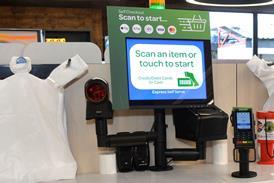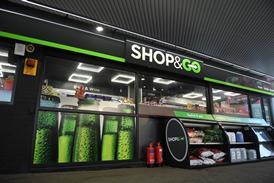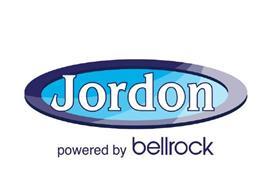If you have a thriving business - or even better, a string of them - then fundraising won’t be a problem. In fact you are probably familiar with the process and may even have a finance director to rustle up the readies.
As award-winning forecourt retailer Susie Hawkins has demonstrated, once you’ve got one successful site its profits can be ploughed into others. "We are now self-funding," says Susie. "We sold our site at Bromsgrove and the proceeds paid for Barnwood. Our success at Barnwood paid for our latest site at Monmouth."
But if you are a small struggling independent looking to improve either via new equipment or a refurb, an extension to the existing premises or the addition of another, you will need some meticulous planning in place especially as forecourts come with a risk factor included.
Having said that, the loan market is very competitive at the moment, so as always, the advice is to shop around. There are institutions out there wishing and wanting to lend you money.
Venture capitalists or ’angels’, who are individuals who will come in to back a business, are an unlikely avenue for someone wanting to just improve the store or buy another business - again, unless you already have a nice group of them. And, in any case, they will want a piece of the business which they will later want to sell, at a profit.
If you’ve got a good track record with your bank then that’s still the easiest and most straightforward way to borrow money and probably the cheapest. Like anything else it may be open to negotiation as well.
Generally the more security a business can provide, the better the terms of the loan will be (eg lower interest rates).
Banks come in various flavours with some more user-friendly than others. In fact NatWest "didn’t think it could help" with the putting together of this article despite two phone calls and two emails (as requested). But Allied Irish (AIB) was on the phone in five minutes.
Kevin Cassidy, senior manager corporate business at the bank’s Glasgow headquarters, is pleased to point out three recent projects.
"We funded Kenny Webster’s (Calanike Ltd) acquistion of his chain of 20 forecourts - acquired on a piece-meal basis; and we funded Express Service Stations, which has just acquired its fourth forecourt in the Glasgow area. The owners are in the market for another three sites and we will be funding those as well."
Then in July AIB also funded Calanike’s friendly takeover of Sangs, the 111-year-old family-owned soft drinks manufacturer. The Sangs’ brands will immediately go into the 20 forecourt shops.
Cassidy dismisses the idea that there’s a ’risk’ factor peculiar to forecourts. "Risk is our business. And the risks for small independent forecourts are like those in any sector. The important thing is to assess it. We take a holistic approach and we regard it as a partnership."
He also dismisses the price tag. "When you get into the price debate it’s risk versus reward. We are essentially a bank that funds and manages SMEs, owner-managed businesses and corporations. In each branch we have decision makers so the funding decision won’t have to go to headoffice."
As a footnote to this it should be added that Allied Irish has been voted best business bank seven times by the Forum of Private Business in its biennial surveys.
== Split it up ==
But you need not necessarily look for a single loan to cover the whole project.
It is probably better to borrow for building works and lease the equipment because then you have some comeback. In fact it might make you look more professional if you split it up in your business plan. It shows you have thought about it carefully. In any case, banks all have leasing departments and can arrange a whole package for you including an overdraft so you can write cheques on the ongoing works in the interim while keeping the loan on deposit, earning interest.
Another option is a commercial mortgage which does not have to be based on a commercial property. You could use private accommodation as security. As this is a competitive market, the interest rates will compare favourably with the high-street banks. If you go down this route with an independent mortgage lender, you will find they will send an advisor around in person which you won’t get from the bank any more.
== On-line advice ==
There is a bit of online help. Back in 2005 the DTI launched two free no-nonsense guides produced by Business Link, the government’s business advice service. One was a guide to small business funding and the second a guide to finance for high-growth companies.
The small business funding guide offers advice on:
l The importance of seeking professional advice from accountants and banks
l The value of a strong business plan.
l Self-funding for your business.
l Obtaining loans and overdrafts from the bank.
l Accepting finance from family and friends.
l Government grants and who may be eligible.
l When and how to seek small scale equity investment.
l Dealing with cash-flow issues.
The guides, which were available free in hard copy through the post, are currently out of stock. A spokeswoman at DTI Publications said: "This is a very, very popular publication. It accounts for almost every other order. But we are out of stock at the moment and don’t know when we will get more. The best advice is to go on-line and download." (www.businesslink.gov.uk)
Potential providers of funds need to see your business vision written down in a concise yet detailed fashion. Obviously your lender will want to know what you are going to spend the money on and how it will improve your situation.
You will need to include a brief history of the business and its performance to date which means a five-year profit and loss account and balance sheet and cash-flow history and forecast. Outline the market, your key members of staff and your professional advisors (accountant, solicitor etc).
To summarise, to secure a loan a business plan is vital. It should include the following:
l An executive summary of no more than two pages.
l A short description of the business opportunity.
l Your marketing and sales strategy.
l Your management team and personnel.
l Your operations: premises, IT etc.
l Financial forecasts (monthly profit and loss, cashflow, balance sheets).
Once you have written all this down as a first draft you need to create your two-page top-line summary which includes your current position, description of your services, sales forecasts, short- and long-term business aims, and a breakdown of how the money will be deployed and repaid.
== Free money ==
Grants are available to small businesses from a variety of sources including the government, the European Union and certain charities with, say, rural interests. Some grants are specific to certain geographic regions.
It is rare to get a grant for more than 50% of the project costs so you will need to consider how you will match the funding. A very important point to remember is that if you do get a grant it will take time to get it processed. Don’t start work until the paperwork is completed as no grant will reimburse you for any money spent before the application has been approved and processed.
A punt round information resource site J4b.co.uk will help you assess whether you might qualify.
Posing as a petrol station in Surrey I learned about the small business rate relief scheme and about energy efficiency loans (interest-free) to help businesses reduce their energy costs.
== Unlikely event ==
A grant or help from your supplier is unlikely, according to Rob Clifford, finalist in the Londis retailer of the year awards, who recently spent £150,000 to bring his forecourt at Torpoint in Devon up to a best-in- the-business state.
He reckons that there are no longer any in-house facilities available - although his symbol group has recently arranged a preferential fast-track loan facility through Lombard Finance, (see box).
"All the petrol companies worry about these days is re-imaging of the site," says Rob.
"They do pay for that but it comes with a five-year contract.
"Before the days of PriceWatch you could sign up with any of the fuel companies and they would advance you money for new pumps, new equipment - anything the site or the shop needed. But since the available margins have gone down by around two-thirds, there is no money available for improvements any more."
And, as for grants, Rob is more than a little comically sceptical.
"Why even bother applying? Given that what we sell will pollute the world and kill all the children. Who’s going to give you a grant to expand on that?" he says.
----
=== case study: philip tout ===
Philip Tout runs three forecourt sites in the West Country.
His recently-refurbished site at Langford, outside Bristol, won him overall first place in the Budgens Store of the Year awards.
"I’ve always used banks," says Philip, "they always want your cash projections, business plan, independent valuation (they appoint the valuers) - but this time I had to change from NatWest to HSBC to get what I wanted.
"I got 1.25% over base rate this time. The best I’ve ever got was 1% but you hear some cases where people pay ridiculous amounts like up to 4%.
"The trouble is that petrol stations are bad news. They wouldn’t lend more than 65% on a petrol station. It goes up to around 70% if you’ve got a decent convenience store.
"The banks lost a lot of money invested in smaller sites when the hypermarkets came along and sites became a big bad risk. Although I think this is beginning to change now.
"I’ve heard that some Budgens stores have raised up to 90% of their capital because of the Budgens model but not if you have a petrol site."
----
=== Quids in ===
Lombard Finance is offering a discounted finance package with a payback time of up to five years for Londis and Budgens retailers interested in refurbishing their stores.
"We launched recently and have already had several enquiries," says Tim Carter, relationship manager, heading up the Lombard franchise team. "Retailers can borrow pretty much what they want - some might only want £10,000 for new air conditioning or an Epos system while others might want £100,000 or more for a major refit."
? Anyone interested can contact Tim Carter direct on 020 7432 2703 or email tcarter@lombard.co.uk
? The loan guarantee scheme booklet, from the DTI, is downloadable from [http://www.dti.gov.uk/publications]























No comments yet